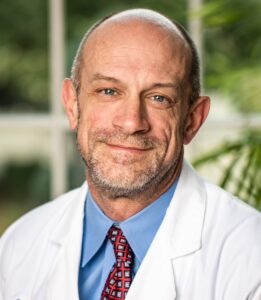
Chris Farrell
Assistant Professor, School of Nursing
Email: clf@clemson.edu
Biosketch
Dr. Christopher Farrell is an assistant professor in the Healthcare Genetics and Genomics (HCG) program at Clemson University. Prior to joining Clemson University, Dr. Farrell worked in the pharmaceutical industry for several years on vaccines and monoclonal antibody therapies. He then received his Ph.D. in Biomedical Sciences from the University of South Carolina. He has taught in the healthcare programs of several institutions such as Presbyterian College, Manchester University, and Campbell University. His area of research is cancer genetics, cancer education in rural communities, pharmacogenomics education and the study of inherited disorders such as Aarskog-Scott and Fraser syndromes.
Research
Multi-drug resistance (MDR) is a serious complication in the treatment of cancer patients. MDR can become an obstacle to chemotherapy treatment in solid tumors of any stage but is more commonly associated with late stage and/or aggressive tumors. Patients with MDR tumors have a poor prognosis compared to patients with a tumor which is responsive to chemotherapy. A patient’s tumor can develop MDR before or after the initiation of chemotherapy treatment. The cause of MDR after the initiation of chemotherapy is well understood, but it is not known how tumors develop MDR before chemotherapy treatment. With identifying a connection in MDR tumors of chemotherapy-naïve patients, we hope to discover biomarkers that will lead to better treatment plans for patients who are starting the initial chemotherapy treatment.
Publications
Farrell CL et al. “Assessing the pharmacy students’ knowledge of genetic counseling with genetic variants that are associated with inherited disease.” Currents in Pharmacy Teaching and Learning (2023).
Meaddough EL, Sarasua SM, Fasolino TK, Farrell CL. The impact of pharmacogenetic testing in patients exposed to polypharmacy: a scoping review. The Pharmacogenomics Journal. 2021 Jun 17:1-4
Chart NA, Kisor DF, and Farrell CL. “Defining the role of pharmacists in medication-related genetic counseling.” Personalized Medicine 18.05 (2021): 509-522.
Kisor DF & Farrell CL. Expanding Pharmacist and Student Pharmacist Access to Genetics/Genomics/Pharmacogenomics Competency Education. Journal of medical education and curricular development. (2019):2382120519834325.
Kisor DF, Calinski DM, & Farrell CL. “Beyond the didactic lecture: pharmacogenomics in pharmacy education.” Precision Medicine (2018): 9-12.
Shull AY & Farrell CL. “‘Et tu, inhibitor?’: the potential for HIV inhibitors to prime P-gp-mediated chemoresistance in cancer.” Future Sci OA (2017): 23: 4
Caudle, N & Farrell C. “Community Education of Personalized Breast Cancer Therapy Utilizing Students of Healthcare Profession” Clinical Medicine Research, 2017: 6(5):157-163.
Beasley S, Buckhaults PJ, Pedigo NG, & Farrell CL. Association of FGD1 polymorphisms with early-onset breast cancer. Oncology letters, 2016: 2(3), 2071-2077.
Pedigo NG, Van Delden D, Walters L, & Farrell CL. “Minireview: Role of genetic changes of faciogenital dysplasia protein 1 in human disease.” Physiological Genomics July 2016: 48 (7) 446-454
Kisor D, Smith HE, Grace E, Johnson SG, Weitzel KW, & Farrell CL. “The DNA of pharmacy education.” American Association of Colleges of Pharmacy (AACP) on the Center for the Advancement of Pharmacy Education (CAPE) Website (Published on the AACP Website in March 2016)
Farrell CL, Pedigo NP, & Messersmith AR. “Application of genomic principles to pharmacotherapy of cancer.” American journal of pharmaceutical education 78.3 (2014).
Birtwistle MR, Berrong Z, Duff K, Cloessner E, Tidwell J, Clendenning M, Wilkerson B, Farrell CL, Bunz F, Jai H, Michael Shtutman M, Creek KE, Banister. CE, Buckhaults PJ. “Transcriptomes and shRNA suppressors in a TP53 allele–specific model of early-onset colon cancer in African Americans.” Molecular Cancer Research 12.7 (2014): 1029-1041
Farrell CL, Goodbar NH, Freeland KN, Grace EG, Buckhaults PJ, & Moore KG. “Clinical application of pharmacogenomics through clinical exercises and online resources.” Currents in Pharmacy Teaching and Learning 6.4 (2014): 571-576.
Farrell CL. “Decreasing Drug Resistance through modulation/inhibition of the p-glycoprotein.” Austin J Pharmacol Ther 2.6 (2014): 2.
Shull AY, Clendenning ML, Sampa Ghoshal-Gupta S, & Farrell CL, Vangapandu, HV, Dudas, L, Wilkerson, BJ, Buckhaults, PJ. “Somatic mutations, allele loss, and DNA methylation of the Cub and Sushi Multiple Domains 1 (CSMD1) gene reveals association with early age of diagnosis in colorectal cancer patients.” PloS one 8.3 (2013): e58731.
Lin Y, Buckhaults PJ, Lee JL, Xiong H, Farrell C, Podolsky RH, Schade RR, Dynan WS. “Association of the actin-binding protein transgelin with lymph node metastasis in human colorectal cancer.” Neoplasia 11.9 (2009): 864-IN5.
Meeh, PF, Farrell CL, Croshaw R, Crimm H, Miller SK, Oroian D, Kowli S, Zhu J, Carver W, Wu W, Pena E, Buckhaults PJ. “A gene expression classifier of node-positive colorectal cancer.” Neoplasia 11.10 (2009): 1074-IN12.
Farrell CL, Crimm H, Meeh P, Croshaw R, Barbar TD, Vandersteenhoven JJ, Butler W, Buckhaults P. “Somatic mutations to CSMD1 in colorectal adenocarcinomas.” Cancer biology & therapy 7.4 (2008): 609-613
Sjoblom T, Jones S, Wood LD, Parsons DW, Lin J, Barber T, Mandelker D, Leary RJ, Ptak J, Silliman N, Szabo S, Buckhaults P, Farrell C, Meeh P, Markowitz SD, Willis J, Dawson D, Willson JK, Gazdar AF, Hartigan J, Wu L, Liu C, Parmigiani G, Park BH, Bachman KE, Papadopoulos N, Vogelstein B, Kinzler KW, Velculescu VE. “The consensus coding sequences of human breast and colorectal cancers.” Science 314.5797 (2006): 268-274.
